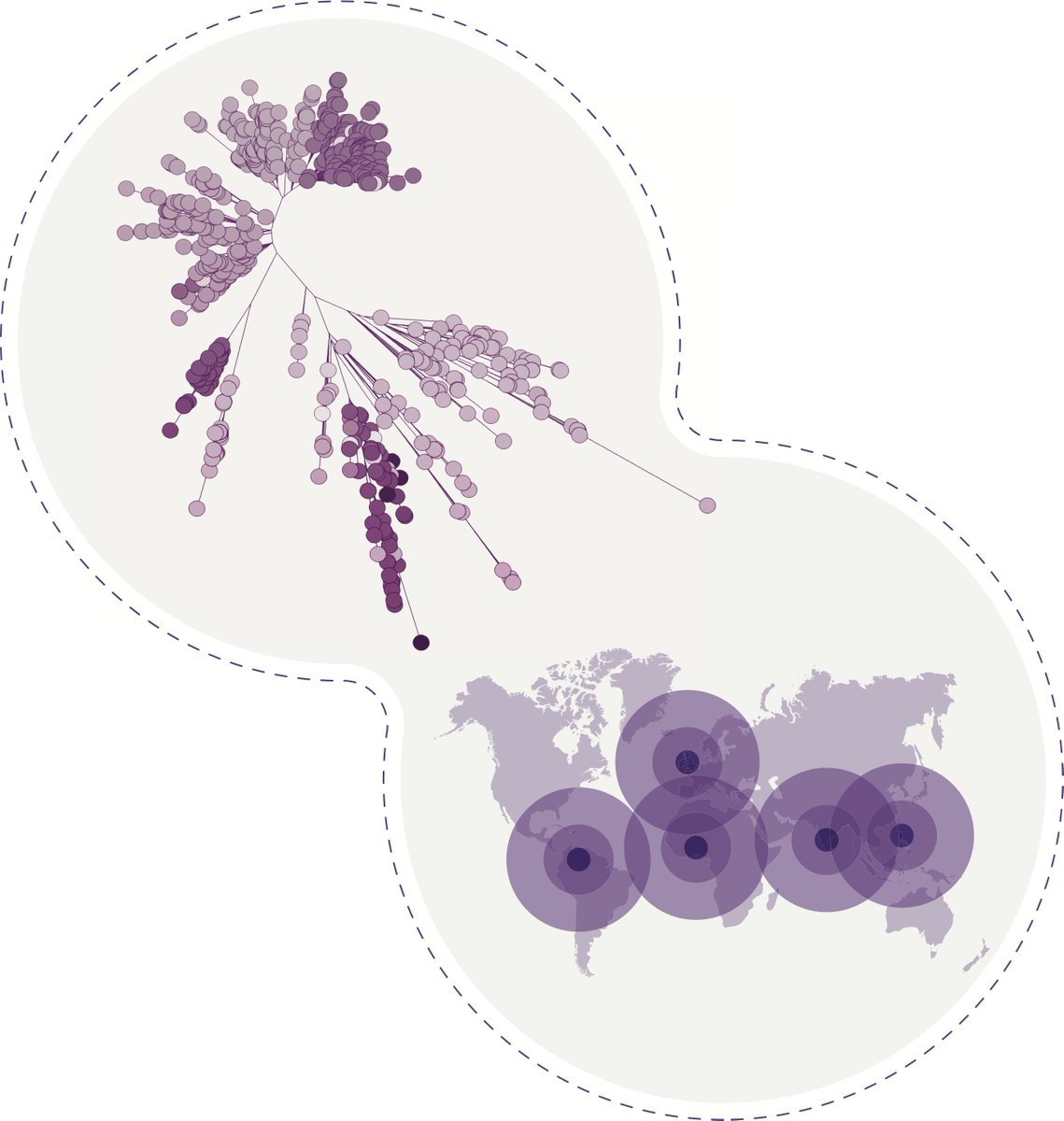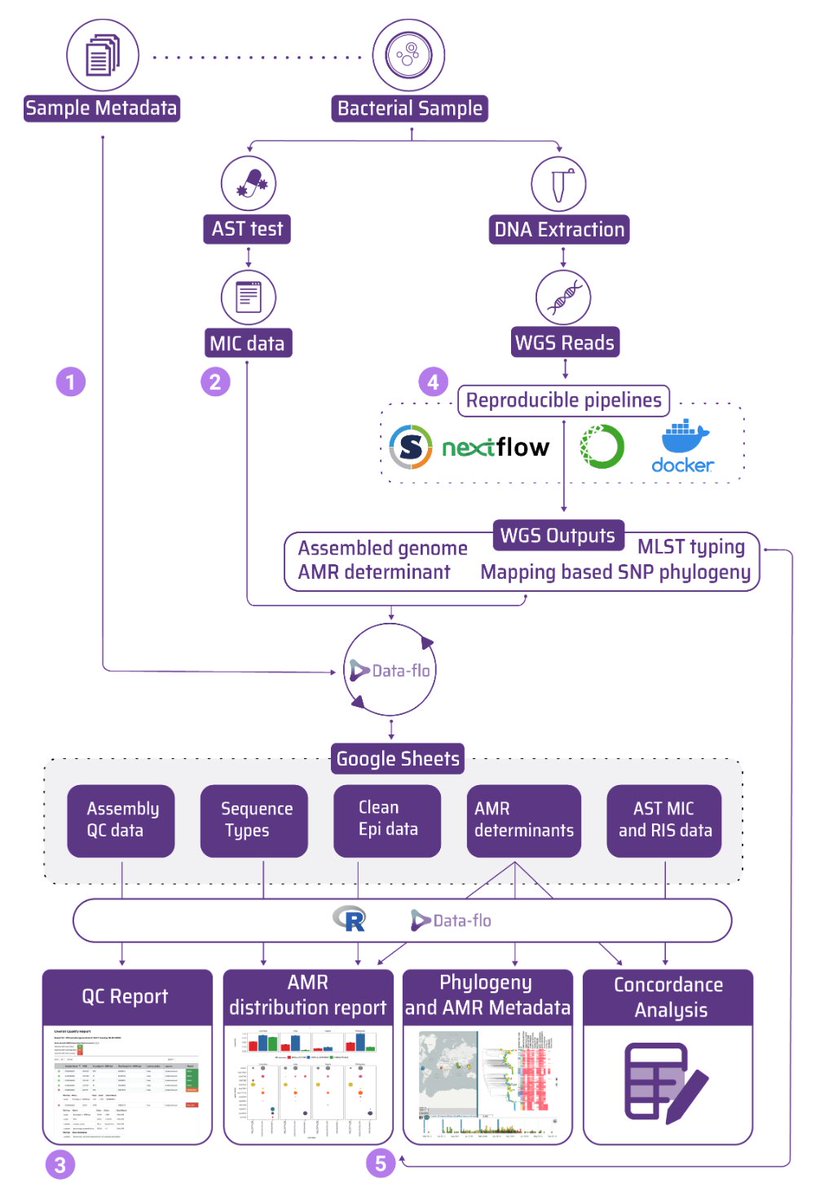
Repost of a thread highlighting some of the achievements of our international collaboration focussing on genomic surveillance of AMR. Here we detail a series of preprints, coming out soon as a special edition in a peer reviewed journal.
(original posted late Friday)
0/10
(original posted late Friday)
0/10
The @NIHRglobal @GHRUamr
focuses on sustainable Genomics for national #AMR surveillance in Colombia, India, Nigeria, and the Philippines and local / global genomic context for ongoing surveillance of major #AMR pathogens. Here we detail our work with a series of preprints (1/10)
focuses on sustainable Genomics for national #AMR surveillance in Colombia, India, Nigeria, and the Philippines and local / global genomic context for ongoing surveillance of major #AMR pathogens. Here we detail our work with a series of preprints (1/10)

Laboratory Implementation : An interactive approach to implement genomic sequencing across sites via lab assessment, assembly, optimisation, and re-assessment to deliver surveillance capacity.
@cake_ray @Geetha66538200 @anderson_ose @ghruamrcol
doi.org/10.21203/rs.3.… (2/10)
@cake_ray @Geetha66538200 @anderson_ose @ghruamrcol
doi.org/10.21203/rs.3.… (2/10)

Bioinformatics and data flow: Here we detail bottlenecks in bioinformatics deployment and routes to overcoming these by including standardised workflows across all laboratories.
@Ayorinde_Afo @varunshamanna @turrisita @MonicaAbrudan @bioinformAnt
doi.org/10.31219/osf.i… (3/10)
@Ayorinde_Afo @varunshamanna @turrisita @MonicaAbrudan @bioinformAnt
doi.org/10.31219/osf.i… (3/10)

Financial Capacity Building: International efforts to standardise management of grants are covered by Good Financial Grant Practice (GFGP). Here we describe the use of GFGP to increase institutional capacity
@HarryHarste @gennykiff @iruka_okeke
doi.org/10.31219/osf.i… (4/10)
@HarryHarste @gennykiff @iruka_okeke
doi.org/10.31219/osf.i… (4/10)

Training: Here we detail our Train-the-Trainer approach to apply effective methods for training others in bioinformatics and laboratory techniques required for genomic surveillance of #AMR.
@MonicaAbrudan @alicepn @dusanka @eventsWCS
biorxiv.org/content/10.110… (5/10)
@MonicaAbrudan @alicepn @dusanka @eventsWCS
biorxiv.org/content/10.110… (5/10)

Colombia:
@SomosAGROSAVIA
describe how Klebsiella pneumoniae clonal expansions of CG258 carry KPC-3 and NDM-1 whilst other high-risk clones such as CG147, CG307, and CG152 carry diverse carbapenemases
@ghruamrcol @pilarxavier @INSColombia
biorxiv.org/content/10.110… (6/10)
@SomosAGROSAVIA
describe how Klebsiella pneumoniae clonal expansions of CG258 carry KPC-3 and NDM-1 whilst other high-risk clones such as CG147, CG307, and CG152 carry diverse carbapenemases
@ghruamrcol @pilarxavier @INSColombia
biorxiv.org/content/10.110… (6/10)

India: Here, @CrlKims highlight the presence of high-risk international Klebsiella clones and identify a persistent outbreak of carbapenem and cephalosporin resistant ST231 isolates in one hospital.
@Geetha66538200 @varunshamanna
biorxiv.org/content/10.110… (7/10)
@Geetha66538200 @varunshamanna
biorxiv.org/content/10.110… (7/10)

Nigeria: @UniIbadan uncover known+novel lineages of K. pneumoniae including MDR ESBL-producers & rarely carbapenemase-producing isolates enabling the identification of putative outbreak clusters in hospitals. @Ayorinde_Afo @anderson_ose @iruka_okeke biorxiv.org/content/10.110… (8/10) 

Philippines: The power of genomics to detect previously unseen outbreaks in different locations caused by a common #AMR mechanism and vehicle is demonstrated by @RITMPH and genomics is also compared to cluster detection based on phenotypic data.
biorxiv.org/content/10.110… (9/10)
biorxiv.org/content/10.110… (9/10)

Here we detail the global landscape of Klebsiella genomics and provide an ongoing resource for surveillance through @pathogenwatch We analyse 1636 genomes sequenced by our consortium together with 16,537 public genomes (all with geospatial data)
biorxiv.org/content/10.110… (10/10)
biorxiv.org/content/10.110… (10/10)

This work was led by and in the group of Professor K.L. Ravi Kumar @KLRavikumar
• • •
Missing some Tweet in this thread? You can try to
force a refresh






